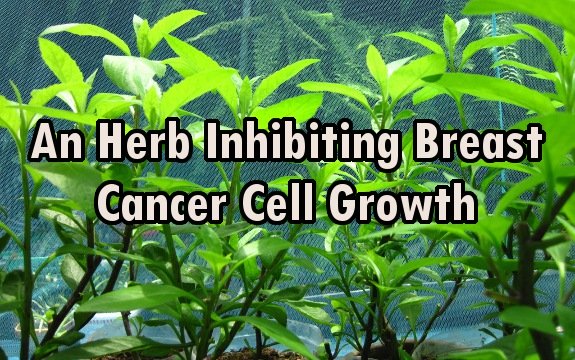Research Finds Rare Vine Naturally ‘Halts Breast Cancer Development’

 Despite dishing out mammograms, chemotherapy, and spending millions of dollars of breast cancer ‘awareness’, breast cancer continues to be one of the top killers of women in the United States. And while no one facing such a serious disease wants to be told that mainstream medicine might be part of the problem, it may very well be (with some research showing that radiation treatment makes breast cancer worse). But don’t worry; there are a myriad of peer-reviewed medical studies on herbs and plant compounds that halt breast cancer in its tracks.
Despite dishing out mammograms, chemotherapy, and spending millions of dollars of breast cancer ‘awareness’, breast cancer continues to be one of the top killers of women in the United States. And while no one facing such a serious disease wants to be told that mainstream medicine might be part of the problem, it may very well be (with some research showing that radiation treatment makes breast cancer worse). But don’t worry; there are a myriad of peer-reviewed medical studies on herbs and plant compounds that halt breast cancer in its tracks.
In a relatively new study published July of 2013 in Plos One, we are introduced to yet another breast cancer treatment which is completely non-invasive and inexpensive. A well-known herb used throughout Southeast Asia belonging to the Asteraceae family, and used in Malaysian recipes for decades is rendering breast cancer cell lines defunct.
Gynura procumbens has been used widely as a treatment for kidney problems, high cholesterol levels, diabetes, and high blood pressure, but with the new study presented by Chaw-Sen Hew, Boon-Yin Khoo, and Lay-Harn Gam, we now know that the plant defense proteins such as peroxidase, thaumatin-like proteins and miraculin in the leaf of G. procumbens:
“. . .inhibit the growth of a breast cancer cell line, MDA-MB-231, at an EC50 value of 3.8 µg/mL. The mRNA expressions of proliferation markers, Ki67 and PCNA, were reduced significantly in the MDA-MB-23 cells treated with SN-F11/12. The expression of invasion marker, CCL2, was also found reduced in the treated MDA-MB-231 cells. All these findings highlight the anti-cancer property of SN-F11/12, therefore, the proteins in this fraction can be a potential chemotherapeutic agent for breast cancer treatment.”
Study: Chinese Herb and Iron Kills 98% of Cancer Cells
The plant is called ‘jian feng wei’ in China and ‘daun sambung mjawa’ in Indonesia. In addition to the new findings surrounding breast cancer cell lines, it has been used to treat diabetes, rheumatism, and skin conditions. It’s active compounds and general properties are listed below:
- Anti-Inflammatory: A study of Gynura procumbens ethanol extract showed anti-inflammatory activity.
- Anti-Hypertensive: Oral administration of aqueous extract lowered blood pressure in rats.
- Glucose Lowering: Ethanolic extract of leaves suppressed elevated serum glucose levels in diabetic rats.
- Abundant Leaf Proteins / Peroxidase: A study found few abundant proteins from the leaves of GP; among these, peroxidase was found the most abundant of the extracted proteins. Results suggest a natural source for peroxidase for use in the cosmetic and skin care industry.
- Nutritive / Antioxidative Properties: Ethanolic Gynura extract exhibited the highest antioxidative properties in every assay. Nutritive evaluation suggests the extract is a good protein source and may have positive effects on free radical scavenging and iron chelating.
- Anti-Ulcerogenic: The ethanolic leaf extract of Gynura procumbens may promote ulcer protection.
- Anti-Diabetic: The water extract of G. procumbens may have a hypoglycemic effect by promoting glucose uptake by muscles.
